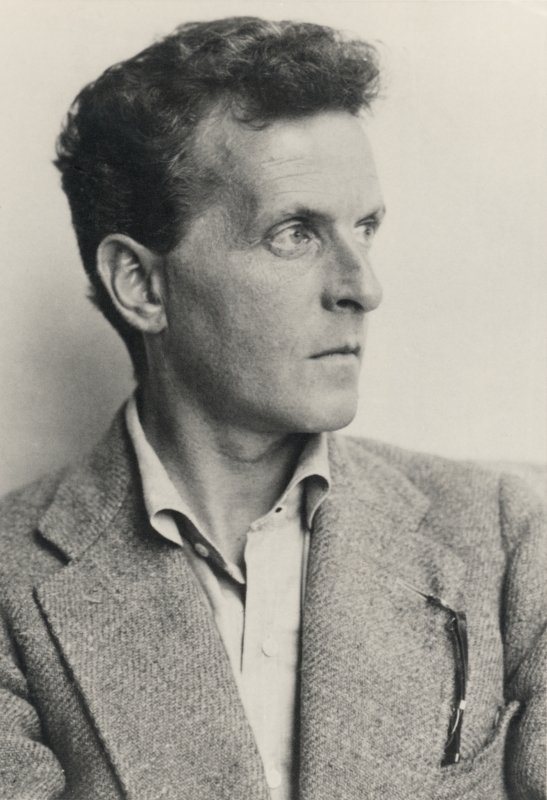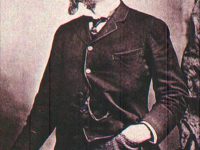
Ludwig Wittgenstein (1889-1951)
On April 26, 1889, Austrian-British philosopher Ludwig Wittgenstein was born. He worked primarily in logic, the philosophy of mathematics, the philosophy of mind, and the philosophy of language. He is considered one of the world‘s most famous philosophers. Wittgenstein‘s influence has been felt in nearly every field of the humanities and social sciences.
“My work consists of two parts: of the one which is here, and of everything which I have not written. And precisely this second part is the important one.” Wittgenstein in a letter to Ludwig von Ficker (1919)
Youth in Vienna
Wittgenstein was born the youngest of eight siblings into one of the wealthiest and most remarkable families of Habsburg Vienna, to Karl Wittgenstein, an industrialist of extraordinary talent and energy who rose to become one of the leading figures in the Austrian iron and steel industry. Although his family was originally Jewish, Karl Wittgenstein had been brought up as a Protestant, and his wife, Leopoldine, also from a partly Jewish family, had been raised as a Catholic. The family home should became a centre of Viennese cultural life during one of its most dynamic phases. Many of the great writers, artists, and intellectuals of fin de siècle Vienna — including Karl Kraus, Gustav Klimt, Oskar Kokoschka, and Sigmund Freud — were regular visitors to the Wittgensteins’ home, and the family’s musical evenings were attended by Johannes Brahms, Gustav Mahler, and Bruno Walter, among others.[1]
The Wittgenstein Family
Three of the Wittgenstein’s brothers, Hans, Kurt, and Rudolf, all committed suicide later in their lives. His brother Paul was a talented pianist who lost an arm during World War I. Maurice Ravel composed Concerto for the Left Hand for him. His sister Gretl had her portrait painted by Gustav Klimt, the great Austrian Art Nouveau painter. Ludwig was the youngest of the children and he was educated at home until he was fourteen years of age. He showed an interest in mechanical things as he grew up and when he was ten years old he made a working sewing machine. In 1903 Wittgenstein began three years of schooling at the Realschule in Linz, Austria, which specialised in mathematics and natural science.[2]
Working with Russel and Frege
As for his career, Wittgenstein studied mechanical engineering in Berlin at the Technische Hochschule in Charlottenburg and in 1908 went to Manchester, England to do research in aeronautics, experimenting with kites. His interest in engineering led to an interest in mathematics which in turn got him thinking about philosophical questions about the foundations of mathematics.[3] Philosopher Bertrand Russell had published his Principles of Mathematics in 1903 and Wittgenstein turned to this work as he sought a better understanding of foundations of his subject [4]. He became so interested in Russell’s work that he decided that he wanted to learn more and travelled to Jena to ask Gottlob Frege’s advice and was told that he should study under Russell.[2]
“The world is all that is the case.” Ludwig Wittgenstein, Tractatus Logico-Philosophicus (1922)
Discovering a Genius
Wittgenstein left his aeronautical research in Manchester in 1911 to study mathematical logic with Russell in Trinity College, Cambridge. Russell was not one to be easily impressed by a student, but he was certainly very impressed by Wittgenstein. He actually described teaching Wittgenstein as “one of the most exciting intellectual adventures [of my life]” and soon realized that Wittgenstein possessed a genius which should be directed towards mathematical philosophy. During this period at Cambridge, Wittgenstein continued to work on the foundations of mathematics and also on mathematical logic. He suffered depression, however, and threatened suicide on a number of occasions. He found Cambridge a less than ideal place to work since he felt that the academics there were merely trying to be clever in their discussions while their ideas lacked depth. [2]
Tractatus Logico-Philosophicus
Wittgenstein went to Skjolden in Norway and this proved an extremely fruitful period during which lived in isolation working on his ideas on logic and language that would form the basis of his great work the Tractatus Logico-Philosophicus. When Wittgenstein’s father died in 1913 he inherited a fortune, which he quickly gave away. When war broke out in 1914, Wittgenstein volunteered for the Austrian army.[3] In 1916 he was sent as a member of a howitzer regiment to the Russian front where he gained many distinctions for bravery. In 1918 he was sent to north Italy in an artillery regiment and he was there at the end of the war, becoming a prisoner of the Italians in Cassino.[2] The result of his thinking on logic was the Tractatus Logico-Philosophicus which was eventually published in English in 1922 with Russell’s help. Actually the manuscript was found in his rucksack when he was taken prisoner of war, but he was allowed to send the manuscript to Russell while he was held in a prison camp in Italy.
“The limits of my language mean the limits of my world.” Ludwig Wittgenstein, Tractatus Logico-Philosophicus (1922)
Primary School Teacher and Gardener
The Tractatus was the only book Wittgenstein published during his lifetime. Having thus, in his opinion, solved all the problems of philosophy, and having been released from detention in 1919, Wittgenstein became an elementary school teacher in rural Austria, where his approach was strict and unpopular, but apparently effective. During this period Wittgenstein was again desperately unhappy and came close to committing suicide on a number of occasions. Eventually, feeling largely that he had failed as a primary school teacher, Wittgenstein gave up in 1925. He still did not feel that he wanted to return to an academic life so he worked at a number of different jobs, such as a gardener’s assistant in the Hüsseldorf monastery near Vienna, or as an architect from 1926-28 meticulously designing and building an austere house in Vienna for his sister Gretl.[3]
Return to Cambridge
In 1929 Wittgenstein returned to Cambridge where he submitted the Tractatus as his doctoral thesis. This work considers the relationship of language to the world. Words, Wittgenstein argued, were representations of objects and combining words led to propositions which were statements about reality, or as he says, pictures of reality. Such statements, of course, may picture a reality which is true or false. Conversely, the world as presented by Wittgenstein in the Tractatus, consists of facts. These facts can be broken down into states of affair, which in turn can be broken down into combinations of objects. This is essentially an atomic theory with the world built from simple objects. He argues that there is a bijection (one-one correspondence) between language and the world.[2]
Misunderstanding and Language
Interestingly his ideas changed rapidly as he abandoned altogether the notion of logical form as it appeared in the Tractatus, along with the theory of meaning that it had seemed to require. Indeed, he adopted a view of philosophy that rejected entirely the construction of theories of any sort and that viewed philosophy rather as an activity, a method of clearing up the confusions that arise through misunderstandings of language.[1] Philosophers, Wittgenstein believed, had been misled into thinking that their subject was a kind of science, a search for theoretical explanations of the things that puzzled them: the nature of meaning, truth, mind, time, justice, and so on. But philosophical problems are not amenable to this kind of treatment, he claimed. What is required is not a correct doctrine but a clear view, one that dispels the confusion that gives rise to the problem. Many of these problems arise through an inflexible view of language that insists that if a word has a meaning there must be some kind of object corresponding to it.[1]
“Whereof one cannot speak, thereof one must be silent.”Ludwig Wittgenstein, Tractatus Logico-Philosophicus (1922)
The Use of Language
The idea that language has many different uses is not a theory but a triviality: “What we find in philosophy is trivial; it does not teach us new facts, only science does that. But the proper synopsis of these trivialities is enormously difficult, and has immense importance. Philosophy is in fact the synopsis of trivialities.”[1] From 1936 to 1937, Wittgenstein lived again in Norway, where he worked on the Philosophical Investigations. While he was in Ireland in March 1938, Germany annexed Austria in the Anschluss; the Viennese Wittgenstein was now a citizen of the enlarged Germany and a Jew under the 1935 Nuremberg racial laws, because three of his grandparents had been born as Jews.
Late Academic Career
In 1939, Wittgenstein was appointed to the chair in philosophy at Cambridge where he remained until he resigned in 1947. He retired and moved to an isolated cottage on the west coast of Ireland. His health deteriorated and in 1949 cancer was diagnosed. Wittgenstein did not seem unhappy at the diagnosis since he said that he did not wish to live any longer. He continued to work on his ideas until a few days before his death in 1951.[2]
Daniel Bonevac, Wittgenstein’s Tractatus, [7]
References and Further Reading:
- [1] Ludwig Wittgenstein, British philosopher, Britannica Online
- [2] O’Connor, John J.; Robertson, Edmund F., “Ludwig Joseph Johann Wittgenstein“, MacTutor History of Mathematics archive, University of St Andrews.
- [3] Ludwig Wittgenstein at the Internet Encyclopedia of Philosophy
- [4] The time you enjoy wasting is not wasted time – Bertrand Russell, Logician and Pacifist, yovisto blog, July 11, 2012.
- [5] Gottlob Frege and the Begriffsschrift, SciHi blog, November 8, 2013.
- [6] Ludwig Wittgenstein at Wikidata
- [7] Daniel Bonevac, Wittgenstein’s Tractatus, Introductio to Ludwig Wittgenstein’s Tractatus Logico-Philosophicus, The Analytic Tradition, Spring 2017, Daniel Bonevac @ youtube
- [8] Stern, David (September 2010). “The Bergen Electronic Edition of Wittgenstein’s Nachlass”. European Journal of Philosophy. 18 (3): 455–467
- [9] Wittgenstein, Ludwig (1922). Tractatus Logico-Philosophicus: Side-By-Side-By-Side Edition. Kegan Paul.
- [10] Xanthos, Nicolas, “Wittgenstein’s Language Games”, in Louis Hebert (dir.), Signo (online), Rimouski (Quebec, Canada), 2006
- [11] Timeline for Ludwig Wittgenstein, via Wikidata





